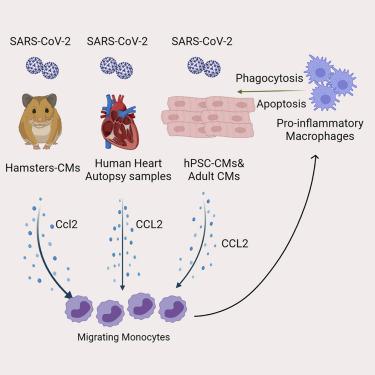Stem Cell Reports ( IF 5.9 ) Pub Date : 2021-07-20 , DOI: 10.1016/j.stemcr.2021.07.012 Liuliu Yang 1 , Benjamin E Nilsson-Payant 2 , Yuling Han 1 , Fabrice Jaffré 1 , Jiajun Zhu 1 , Pengfei Wang 3 , Tuo Zhang 4 , David Redmond 5 , Sean Houghton 5 , Rasmus Møller 6 , Daisy Hoagland 6 , Lucia Carrau 2 , Shu Horiuchi 2 , Marisa Goff 2 , Jean K Lim 2 , Yaron Bram 7 , Chanel Richardson 7 , Vasuretha Chandar 7 , Alain Borczuk 8 , Yaoxing Huang 3 , Jenny Xiang 4 , David D Ho 3 , Robert E Schwartz 9 , Benjamin R tenOever 2 , Todd Evans 1 , Shuibing Chen 1

|
Heart injury has been reported in up to 20% of COVID-19 patients, yet the cause of myocardial histopathology remains unknown. Here, using an established in vivo hamster model, we demonstrate that SARS-CoV-2 can be detected in cardiomyocytes of infected animals. Furthermore, we found damaged cardiomyocytes in hamsters and COVID-19 autopsy samples. To explore the mechanism, we show that both human pluripotent stem cell-derived cardiomyocytes (hPSC-derived CMs) and adult cardiomyocytes (CMs) can be productively infected by SARS-CoV-2, leading to secretion of the monocyte chemoattractant cytokine CCL2 and subsequent monocyte recruitment. Increased CCL2 expression and monocyte infiltration was also observed in the hearts of infected hamsters. Although infected CMs suffer damage, we find that the presence of macrophages significantly reduces SARS-CoV-2-infected CMs. Overall, our study provides direct evidence that SARS-CoV-2 infects CMs in vivo and suggests a mechanism of immune cell infiltration and histopathology in heart tissues of COVID-19 patients.
中文翻译:

心肌细胞在 SARS-CoV-2 感染后通过分泌 CCL2 募集单核细胞
据报道,多达 20% 的 COVID-19 患者出现心脏损伤,但心肌组织病理学的病因仍不清楚。在这里,使用体内建立的在仓鼠模型中,我们证明可以在受感染动物的心肌细胞中检测到 SARS-CoV-2。此外,我们在仓鼠和 COVID-19 尸检样本中发现了受损的心肌细胞。为了探索该机制,我们表明人多能干细胞衍生的心肌细胞(hPSC 衍生的 CM)和成人心肌细胞(CM)均可被 SARS-CoV-2 有效感染,从而导致单核细胞趋化细胞因子 CCL2 的分泌和随后的单核细胞募集。在受感染的仓鼠的心脏中也观察到 CCL2 表达增加和单核细胞浸润。尽管受感染的 CM 受到损害,但我们发现巨噬细胞的存在显着减少了 SARS-CoV-2 感染的 CM。总体而言,我们的研究提供了 SARS-CoV-2在体内感染 CM 的直接证据并提出了 COVID-19 患者心脏组织中免疫细胞浸润和组织病理学的机制。

























 京公网安备 11010802027423号
京公网安备 11010802027423号